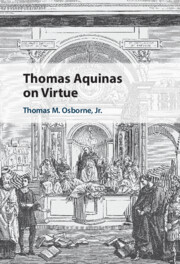Book contents
- Thomas Aquinas on Virtue
- Thomas Aquinas on Virtue
- Copyright page
- Contents
- Acknowledgments
- Note on the Texts
- Abbreviations
- Introduction
- Chapter 1 The Definition of Virtue
- Chapter 2 Intellectual and Moral Virtue
- Chapter 3 Divisions of Moral Virtue
- Chapter 4 Natural and Supernatural Virtue
- Chapter 5 The Properties of Virtue
- Chapter 6 Thomistic Virtue and Contemporary Thought
- Conclusion
- Bibliography
- Index
Chapter 2 - Intellectual and Moral Virtue
Published online by Cambridge University Press: 09 June 2022
- Thomas Aquinas on Virtue
- Thomas Aquinas on Virtue
- Copyright page
- Contents
- Acknowledgments
- Note on the Texts
- Abbreviations
- Introduction
- Chapter 1 The Definition of Virtue
- Chapter 2 Intellectual and Moral Virtue
- Chapter 3 Divisions of Moral Virtue
- Chapter 4 Natural and Supernatural Virtue
- Chapter 5 The Properties of Virtue
- Chapter 6 Thomistic Virtue and Contemporary Thought
- Conclusion
- Bibliography
- Index
Summary
Chapter 2 is on the distinction between intellectual and moral virtue, which was first clearly delineated by Aristotle. Moral virtues correspond to what are most commonly recognized to be virtues, such as justice and courage. Intellectual virtues are habits of knowing that do not on their own make the agent good. Prudence, however, is significant as an intellectual virtue precisely because of its connection with the moral virtues. Prudence depends on moral virtue, and each moral virtue depends on prudence. Thomas emphasizes that the one virtue of prudence covers the material that belongs to all of the distinct moral virtues.
- Type
- Chapter
- Information
- Thomas Aquinas on Virtue , pp. 44 - 81Publisher: Cambridge University PressPrint publication year: 2022

